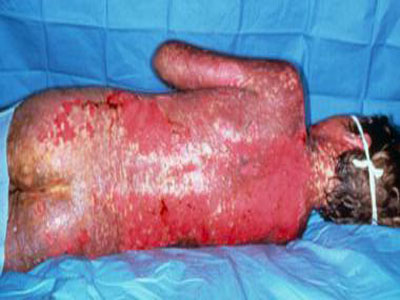
The warning from the Minister of Health, Professor Isaac Adewole, concerning the health challenges posed by the Steven Johnson Syndrome (SJS), should be taken seriously, both by the health providers and the general public. The ailment is considered a rare but serious disorder of the skin and the mucous membrane, arising from reactions to medication or from an infection, and very rarely from cancer. The syndrome has flu-like symptoms, like fever, sore throat and fatigue, which could easily be misdiagnosed, and is then treated with antibiotics. An SJS patient suffers heavy rashes all over the body, which turns to blisters, that die and shade off.
According to the minister, the warning became necessary following the death of a sibling of a marathoner, Fedeshola Adedayo, of the ailment. Patients afflicted by SJS also suffer ulcers in the mouth and lips, lesions in the mucous membrane and severe pains, which make it difficult for the patient to eat or drink. Such ulcers could also affect the genital and anal parts of the body. With multiple symptomatic challenges, treatments are usually merely supportive and symptomatic, and there is usually a general disagreement on the treatment model among health professionals.
Considering that a major cause of the SJS arises from reaction to medication, the ministry of health at the federal and state levels may have to mount vigorous national campaigns to educate both the general public and the local health providers, on what to avoid or look out for. For the health providers, there is need to provide information as to how they can differentiate between the look-alike symptoms of SJS, and the real thing. Again, with basic test facilities, the local health practitioners would be able to avoid administering drugs that can cause SJS.
There may also be need to train special health officials on the most modern way of treating SJS, even as the government could establish few centres of excellence to deal with proven cases. Indeed, considering the rarity of the ailment, and its severity whenever it strikes, the federal or state governments can take responsibility for treating the patients, at such special centres, to reduce the number of fatalities. The drugs and the expertise for the treatment would be concentrated at such centres, with information available all across the country.
We also believe the National Agency for Food and Drug Administration and Control (NAFDAC) has a serious role to play in monitoring the medications in the market, particularly those that have the potential to cause SJS. Indeed, the agency is in a position to provide warning stamps on such medications and to insist that such medications can only be procured based on prescription by medical practitioners. The agency can also get involved through enlightenment programmes to warn the public on what types of drugs to be wary of, particularly through the unwholesome practice of self-medication.
While urging for increased attention to the medications and the kinds of infections that trigger SJS, we urge governments at all levels to improve health facilities and the capacity of the health providers across the country. The decay in the health sector affects the primary, secondary and tertiary health care facilities; despite the huge resources expended by the previous governments, on providing the so called centres of excellence.
Going forward, the present administration must brace up to provide efficient and effective health facilities across the country to tame the scary SJS. With our country facing severe shortage of foreign exchange, the three tiers of government cannot pretend not to be aware of the huge resources expended by Nigerians in search of medical services abroad.

No comments:
Post a Comment